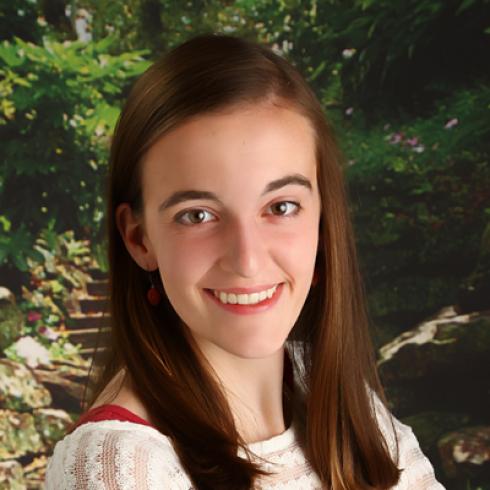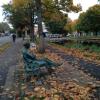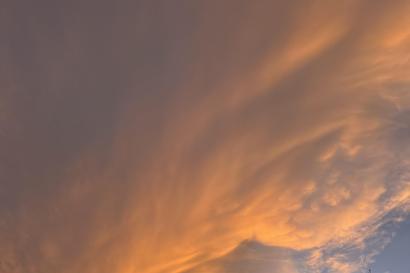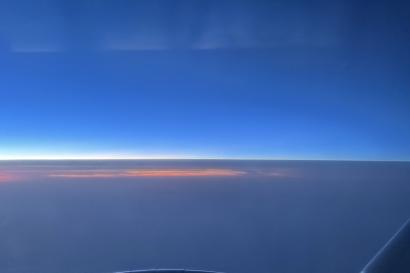It isn’t that I can’t spin off some simple definition for the brave or the beautiful here. I’ve seen enough saccharine television, read enough moralizing novels, and lived enough years to know that bravery involves acting in spite of the pit in your stomach. I’ve heard enough gushy exclamations, heard enough places described, to know the kinds of things that people find beautiful – wide open acres and girls in unwrinkled dresses, brightly coloured flowers and untouched mountain slopes, the shine of the sun upon a rocky beach and the wide grin of a baby boy in a stroller, and so much more, too much to ever list here.
I’ve been taught, too, that these two things, the brave and the beautiful, have something to do with one another. I’ve sat through enough art history lectures to know that the fearsome intersects with the beautiful at the place that Sir Edmund Burke called the sublime. One can find the sublime in paintings like Frederic Edwin Church’s Niagara Falls, which depicts the twisting torrent of water, the angry clarity of the blue-green waves. Art critics have called these things both gorgeous and terrifying, so that each of these adjectives receives some measure of its strength from the other. In the art world, the Falls are fantastic because they are fearsome.
Surely, the scholars are right. It’s just that this doesn’t exactly seem to hold true in my world, in my real experience. I live just twenty minutes from the Niagara Falls and so have visited them intermittently throughout my life – whenever we had guests from out of town, whenever we needed a day trip and there was nothing else to do. I've never really been afraid while standing before them, whether I was perched above, watching the water fall away from me into a burst of white foam at the far-away bottom, or whether I was standing below, water droplets flying into my face, dwarfed by the sheer power of what existed forever beyond me, something I couldn't attain to even if I ascended the steps. I was made to feel small then, yes. I was even made to feel powerless in the midst of something I had not a prayer in the world to understand. But I don't remember feeling scared.
I should stop here to say that I am not trying to inch my way towards the thesis that I am some singularly fearless person or even that I have become so over these past two months of study abroad. To make such a contention would involve overlooking boatloads of evidence, such as the way I was terrified to meet the owner of the cabin we were renting while we waited for him at the Ballyvaughan bus stop (partially because I was worried he might be creepy and partially because I was worried he wouldn’t like us) and how hard I scrubbed at the pen mark I accidentally left on the table of that cabin once we’d arrived, overcome by fears that the owner was going to be angry about it. I’d have to forget, too, how nervous I was about missing the bus from Ballyvaughan back to Galway on our way out of County Clare. I triple-checked the bus schedule for our return journey, asked the woman in the nearby visitor’s centre to call Bus Éireann to quadruple check that there was, indeed, a bus coming, and then bounced nervously upon the bus stop for a quarter of an hour before it was due to come, just in case it was the kind of bus that you had to really emphatically flag down. The sheer pointlessness of all these measures was fully attested to not only by the arrival of the bus, which pulled up perfectly on time (or well, Irish time, which is to say, five minutes behind schedule) and let us on without a hitch, but also by the perfect placidity of all my friends, who sat happily at the picnic tables by the bus stop while I felt crushed by terrors.
So it isn’t that I am fearless. Indeed, I am constantly afraid, and all the more terribly, constantly afraid of all the wrong things. My fears don’t seem to lead me toward any appreciation or awe of what is great and grand and wondrous in this world. Instead, they seem to sink me more deeply into the mire of the mundane. There is, after all, nothing very beautiful about the possibility of missed buses or permanent pen marks, much less cabin owners or the possibility of botched introductions. These things have to do with order and obsession, with pattern and perfectionism, and there is surely a great distance between the perfect and the beautiful.
But if this is so, if the space between those two things stretches wider even than the distance between the precipice of the Cliffs and the water below, I constantly confuse them. Doesn’t the very focus of this essay give testament to this, the way I can’t even write about the Cliffs, and the beauty they might contain, without worrying that I’m not doing them justice, without wondering if I have a prayer at getting them right, at rendering the mountainsides perfectly – or ought it be beautifully – into words? It seems that I am incapable of writing about the Cliffs without shoving myself into their space and, rather than thinking about the view, wondering where and if and when I fit?
At this point, I suppose, I have collapsed myself within some senseless tower of words with which I once hoped to build a temple. The irony of my fears isn’t lost on me, for it is exactly in trying to articulate my fears that I fall once again under them. And perhaps the way out of this maze, the way of this muddle, is, paradoxically, to accept it, to accept that I will never get to perfection. I will never get to perfect order. Someone will always dislike what I say. Someone will always, probably, have a reason to dislike me. I have to get in the car with the middle-aged Irishman and my four friends, anyway, and not think about my worries so much as the Irish landscape around me, the one I came so many miles to see, rough and purple and cold and beautiful. I have to lose myself in the rolling hills and stone fences and scraggly grasses and red-painted sheep, not the depths of my own brain. Likewise, I have to wait at the bus stop and watch the birds more than the bus, so that my friends are the only ones debating whether the crow that lands next to us is extraordinarily beautiful, for a crow, or still just rather ugly. I have to accept that in writing about the Cliffs, I will always be, in some measure, incomplete and inarticulate. There will always be things about them that I am simply not equipped to say.
If the sublime unites what is beautiful and what is fearsome – and I have to say, I think Edmund Burke was right – then I think that this is so because we fear what has power over us, what touches us in ways we can’t understand. There’s beauty in the acceptance of something greater than us, something outside of us, something, someone, we might someday see and meet and maybe, maybe, love. But fear and beauty can only coexist if bravery forms a bridge between them, if we own up to the fear in our stomachs and let it sweep over us, if we don’t run away. I can only have the chance at stumbling upon beauty if I forget about finding perfection, if I give myself space to stumble in the first place.
If the Cliffs of Moher are a metaphor for life – and I have to say, I think my friend is right in saying so – then I think it’s because for many people, they unite the precipice of what we know with a place that we don’t. This could be land and sky, I suppose, ocean and air, sturdy rock and empty space. It could be life and death. For me, though I think it’s mostly this: the things that I can say, and the things I simply can’t.
I wasn’t afraid of falling off the Cliffs, but I was afraid of failing. It’s for that reason that I closed my notebook, for that reason, too, that I turned to dance. But I can only be proud of my artless arabesque, if I admit that it is both triumph and capitulation, expressive of both adventurousness and fear. I can only call that arabesque brave if I admit that it is a wordless act that renders all words inadequate and, at the same time, encapsulates the truth, the joy, of what I am trying, ever trying, will always try, to put into words.

Chelsea Thomeer
I'm a rising junior at Williams College majoring in English and political science. I love reading and running, Jane Austen and J.K. Rowling, pumpkin bread and pretzels, The Grapes of Wrath and green tea. I'm spending a semester in Ireland to study Irish literature and to work on my own writing.








